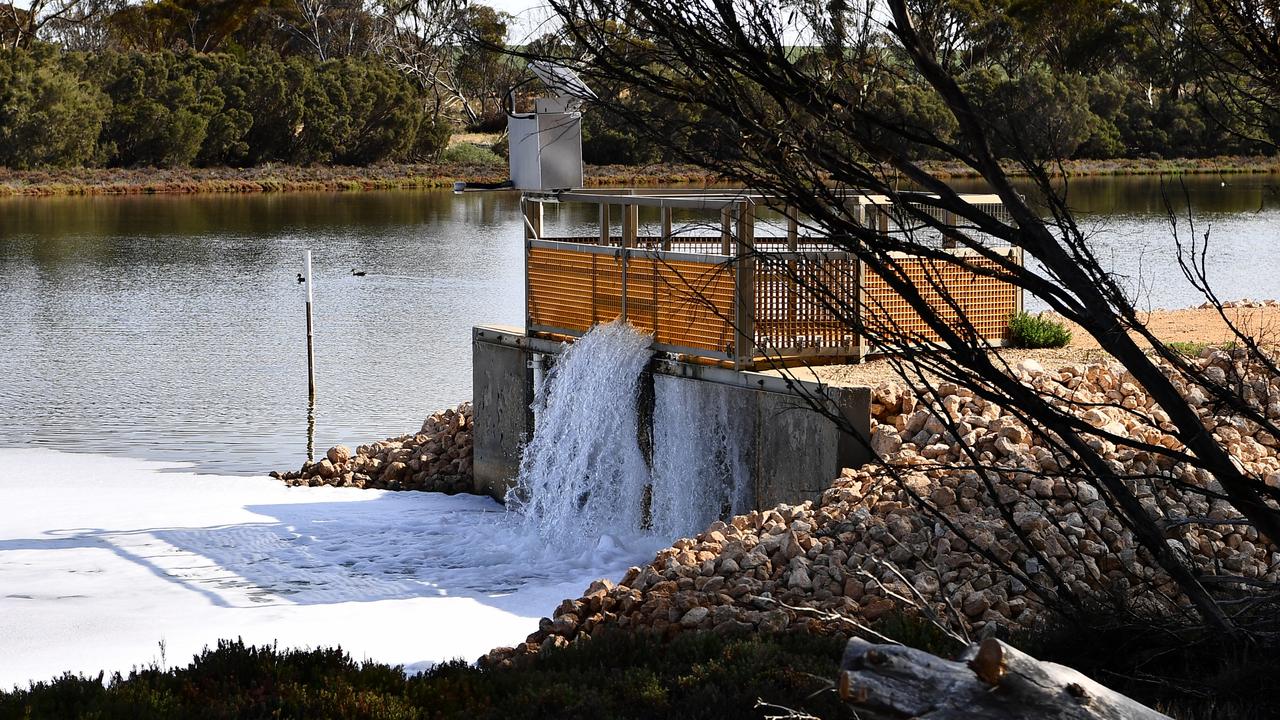Riverland farm under threat of expanding salinisation areas from the Noora Basin
A Riverland farming family is seeking millions in compensation from the state government, because they say its saltwater disposal scheme is turning their paddocks into black slimy sludge.

SA News
Don't miss out on the headlines from SA News. Followed categories will be added to My News.
A Riverland family is seeking around $2m in damages from the state government, after some of their arable cropping land was rendered unproductive due to the Noora Basin.
Since 1982, the government has used the Noora Basin, about 20km east of Loxton, as a disposal basin to stop salty groundwater from ending up in the River Murray.

Yvette and Gary Frahn’s property adjoins the basin and say expanding salinisation areas have gone further than initially predicted by the Environment Department, ruining their land.
The family bought their farm in 1999 with three existing salt pans, but say three new ones have developed and “there appears to be the beginnings of another two”.
“Twenty four years ago we used to grow perfectly good crops on that land, it was a clay loam soil that yielded well,” Mrs Frahn said.
“Now we can’t grow anything on them, we’ve even excluded them from tillage because the soil is fragile and risky to drive across.
“It’s gone from a red clay loam to a salt-encrusted soil with a black slimy clay sludge beneath it.”

Frustrated with the department’s lack of inaction, the family commissioned five independent saline land monitoring reports by farming systems consultant Chris McDonough.
Dr McDonough determined salt-affected land had increased by 15.8ha, from 2019 to 2021, to a total of 82ha since the scheme began.
He wrote most of the spread was outside of department modelling of salinisation zones and forecast a further 20ha of farmland could become unproductive in three to five years.
He noted the family had not received any assistance to manage the issue and recommended immediate funding to maintain, protect and rehabilitate the land, where possible.
A separate independent financial report estimated past and future damages to be $2.6m.
“We think the best way forward is a payout for damages,” said Mrs Frahn, who said the family was the test case for five other adjoining properties.
“The $2.6m doesn’t even include some of the other expenditure like fencing, or revegetation, but what is included is soil testing near the house and we’ve been told if the ground becomes saturated our house is at risk.

“There’s an acid sulfate stench as well, the smell is disgraceful.
“The bottom line is we’re trying to make a living, we’re multi-generational farmers ... our job is to feed the world and we do it really well, we want to get on with the job but this is destroying our children’s heritage.”
The Sunday Mail asked Environment Minister Susan Close whether compensation was being considered by the government.
“This is a complex issue with a history spanning several decades,” Dr Close said.
“I met with the Frahns most recently on March 15 ... and I am currently considering an independently reviewed technical report and advice from the department in relation to the options available.”
A department spokesman said a 20 year agreement with surrounding farms was established in 1982, which specified a compensation payment should the basin degrade farmland.
The spokesman said there were no claims for compensation, “nor realised impacts” and once the agreement expired none of the parties sought an extension.

Mrs Frahn said they were not aware of the agreement at the time and it was never transferred into their name when they bought the property.
The spokesman said they continued to monitor groundwater near the basin and as recently as April developed a “technical note” on the impact to surrounding land.
He said it was independently peer-reviewed and also outlined the significant non-basin related impacts on groundwater levels as a result of increased heavy rainfall since 2005.
He said there was naturally occurring shallow saline groundwater in the area, which had formed salt-affected patches of ground.






